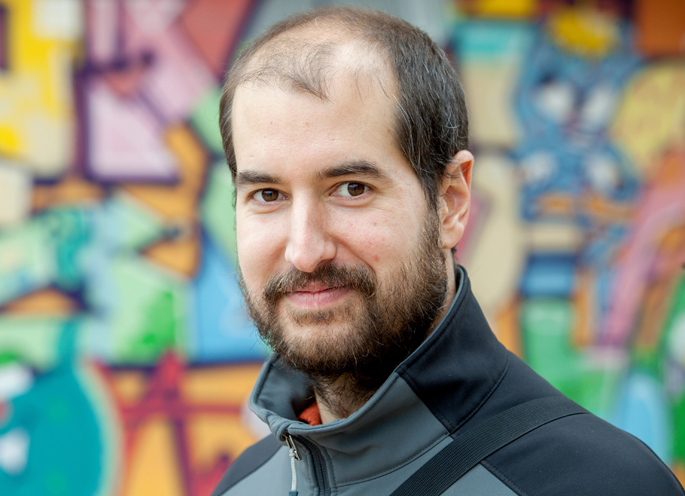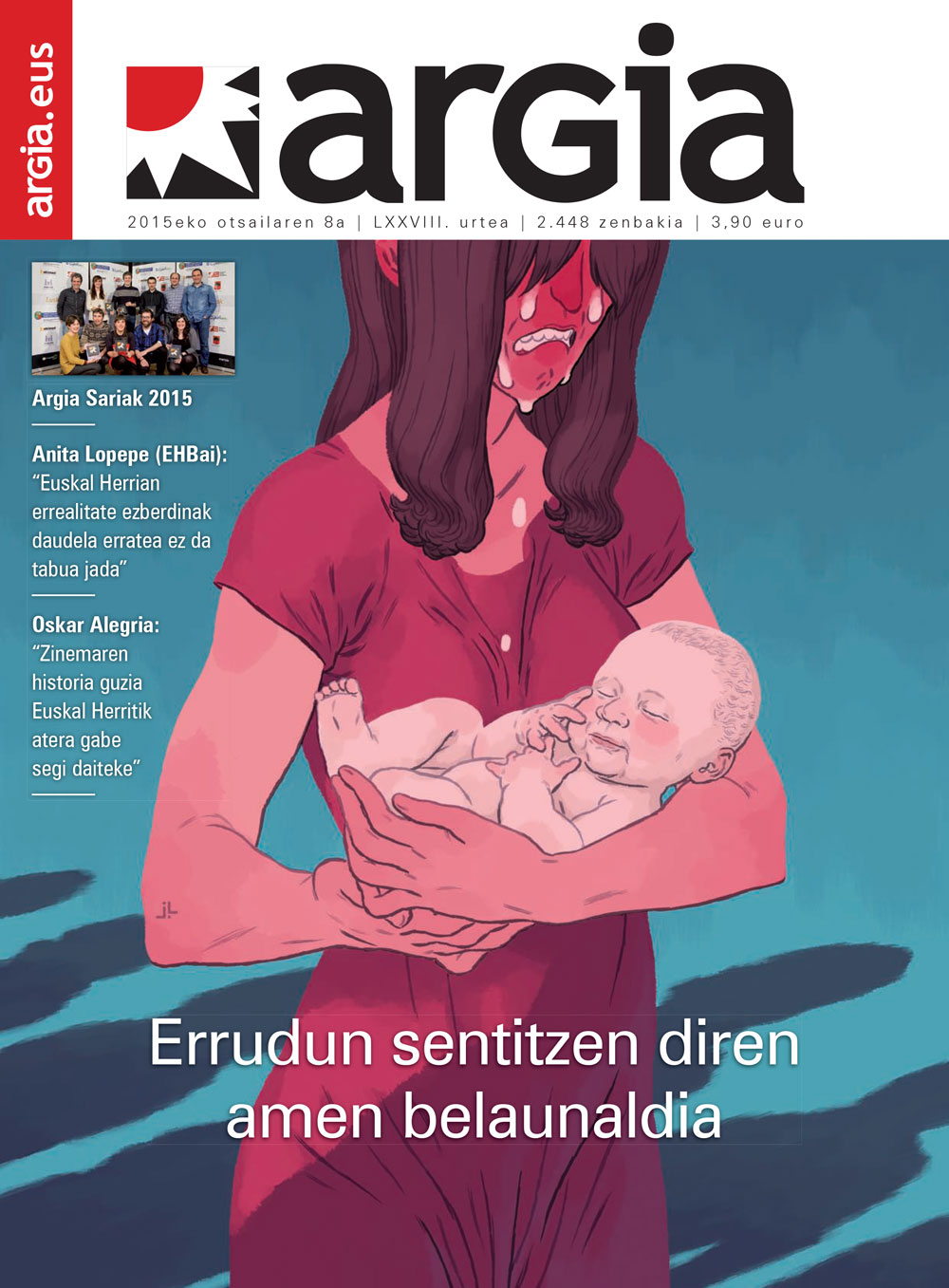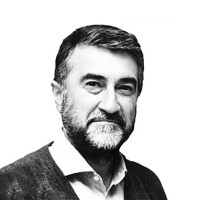"We want to resurrect the Ugandan community so that they can then continue as they want."
- In the Moyo region of Uganda, he has worked for a year organizing the children's band and teaching music teachers. The young musician Aritz Azparren returns home, in the Region of Pamplona/Iruña, to present his new album. In March he has come to look for money and help to return there.

Musician ever since?
The three brothers learned music, powered by our parents. They are two of the creators of the Ardanbera fanfarre of Uharte and they continue to play the bombardment and the violin. We also played fanfare from a very young age. Then we created the Diaforius wind chamber group among five musicians. I love to play in small groups.
He combined music and theology in his student stage.
For two years, I studied Religious Sciences, Theology. I didn't regret having been very interesting, especially because the lessons of the first year were very much related to philosophy, but the effort wasn't too good for health, because in exams I barely had time to sleep.
Why theology? Did you have a vocation?
That's why I started. When I was young, I used to walk a lot with the Burlada Jaberian friars and they pushed me to it, but I decided right away that it didn't have to be a cure. I learned, because I was interested, but no more. Religion is an interesting phenomenon, a matter that only belongs to men.
Are young people ever further away from the Church?
Yes, of course. I think the question would be why young people are not getting closer. Many things that I was taught as a child in the church are what the new party demands today. We can: social justice, eradication of the exclusion of the poor, rejection of injustices… And the problem is not only that the young do not approach, but that they oppose it. But it is normal, because there are behaviors of the Church that are very incomprehensible. For example, potatoes that have been there so far have talked very little about the neoliberal system. What is now seems to be yes, that it is interested in speaking clearly and that is why some say that something will happen to it soon. Another example: there is constant persecution of homosexuals. Many think it's a sin. I do not understand that attitude, and even more, if it were a sin, more reason to support them, as the New Testament says. Perhaps the people who promote these aggressive attitudes are very few within the Church, but they are very famous and powerful. Why are homosexuals persecuted and not, for example, those who have enormous wealth? Usury is one of the seven major sins and nothing is done against it. Only what has to do with sex is what is condemned. In addition, those who make accusations often have more than one of those major sins.
It's a difficult problem. That churches are empty is nothing wrong. Whoever it is. In theory he is the representative of God, and if he does not, it is better for him to disappear. It seems that, in general, human religiosity is not diminishing. In fact, many people are looking for other religions. What is being lost is the strength of the institutional religions. I am completely out of institutional religion, but in Uganda I have a close relationship with it. The truth is that there it looks like a different Church: it does schools, health centers…
Are NGOs currently descendants of missionaries?
Often yes.
Some are accused of wanting to go to help “those of the third world” with the attitude of their savior and generous…
This criticism is justified. A few years ago that was the essence of cooperation: we have more resources, technical and economic, and that is why we came to help you. Many stupid projects have been carried out in this respect. Completely senseless. I was once told that they had served members of a tribe that lived in the South American jungle. Soon they were completely destroyed, because they didn't use them. They didn't need it. Another example: In South America there are thousands of pieces of music from the Baroque era made by European migrants, but we hardly know the music of the natives. Another mistake of cooperation is that we react immediately to emergencies, but then everything is forgotten. Who remembers Haiti today? Today, in general, development activity is changing: it is now the starting point for projects that meet a need expressed by them.
How are you doing in Uganda?
Yes. Moyon was a band of music created by a primary teacher. He told me it would be good to go there and teach music pedagogy. They are the ones who have to decide how they want to develop that project and we have to give them the means to do so. Do not export the models here. It is also clear that the system here is not working properly. In what we call “the first world”, more and more people are struggling to get ahead and are living very badly, in poverty. Is that what we want to spread around the world? After a year at Moyo, they are obviously interested. The creation of the music band is proof of this. So that you can learn the technical aspect of music well and then get in touch with the environment and take a look back to get to know the local music. Continuing to make music will be beneficial in rebuilding society.
Music, therefore, an instrument for the reconstruction of the country?
Post-war societies are very complex. The members of the Madi group, who live in Moyo, were culturally very hard-working. They sent children to school, men and women cultivated the land, cared for the animals, managed the house well… Now that culture has disappeared by war. Before the 1970s war, Moyo's students got the highest grades in all of Uganda and now the worst. What's happened there? If you don’t understand it, if you don’t know where people’s current “laziness” comes from, you can’t do anything here. For example, it happened to many that, after trying to build the house, the soldiers came, their families died and they destroyed everything. Many were left homeless, homeless, and without work all of a sudden, and they had to be exiled. Women are the ones who push the family forward and men barely do anything. What they need now is something that can revive the whole team. People like Nelson Mandela are an exception. Those who have been tortured, beaten and crushed cannot go on with a smile and as if nothing had happened. What their parents have taught them is what is at the heart of our young students. They do not have an appropriate level or an appropriate attitude to learn. The indifference and lack of illusion for the future are terrible.
The main objective of our project is to try to change this situation. We teach the boys and girls in our charge that they must play the instrument today and tomorrow and past and every day. Practice it, come to school on time, wash the instrument after touching and keeping it well… These behaviors are new to them because they have not been taught at home. We want to make natural the behaviors that were once natural to them. It's hard, but if parents see that this effort of their children has good results, they may return to the same nature and behavior as before.
How did you get to this Vura Musik Projekt?
One of our aunts is a missionary. She's been in Uganda for 42 years. He has experienced many extreme situations and has had to flee. He met a native priest named Grace and sought money to help him study in Madrid. They gave him a small amount of financial aid to pay for the studies and the residency, but not to eat. So here too, we started looking for money to help this man. Over time, he has shown how honest, entrepreneur and good person he is. In 1995, we went to Uganda to bring the money raised with the fanfarre Ardanbera and do some concerts there. I came back in 2009 and 2013 and on this last time I met his band. Then I started preparing the project and in that they have helped me a lot in the Hilarion Eslava Music School of Burlada and Villava. And so came the NGO Arua Elkartasuna and Vura Music Project.
What did you do this first year?
The objective of this first year was to know the context, its needs and aspirations. We have formed a group of teachers. It has taken us eight months, but we have achieved it. 32 primary teachers from 16 schools. More than half of them came every day and on time. That is what we must value. We have done the tests and the result has also been very positive. Now, seeing the interest and the desire they have, we can say that we are in a position to move forward.
Are you a teacher?
We work directly with the students on the one hand and with the teachers on the other. In his school resume, musical teaching appears, but they don't know how to do it. So our goal is not just to teach music, but to teach how music is taught.
The challenges for the next stay?
Continue with this group, bring our project to a teaching school and continue with the children at the same time.
Have you come to look for an helper?
Yes, and in search of money. The City Hall of Burlada has given me financial help, we are making concerts with bands of music and choirs and so we are gradually raising money. This is open, of course: if someone is encouraged to organize something, great. On the other hand, we need three volunteer teachers to teach for six months musical language, trumpet and thrombone in Uganda. The idea is that the group should be set up in March of this year. There is no salary, but there are travel, maintenance, medical services… All in exchange for our account work.
For this project, the readers of Diario de Noticias gave you a prize.
Yes, the prize did not give money, but the vote of so many people has been a good way of promoting it. I am also giving lectures at various centres on Uganda and the project. They work on all these issues in a cross-sectional way, and I'm going to finish. The message is the importance of working hard and that we can all do something in one way or another to help us. I don't just ask for help. I want all of this to be worked on in your school.
The best and the worst in Uganda?
The best thing is nature and the way you manage your time in it. It's something that makes us nervous, but very interesting. They have great peace of mind and flexibility. They don't live stressed with the clock. Now I find it hard to adapt to the rhythm here. You also need to walk slowly, because in the long run the heat is very hard. If you don't sleep, for example, you feel that you're running out of energy. And what I like the least is something like that. A kind of recklessness. On the other hand, there is also a lot of corruption there, almost as much as here, but since there is less money there, if a subsidy disappears, the consequence can be very serious, for example, the disappearance of a school or a health centre. And they don't react. Moyon lives and is over. They are content with what they have. They lack initiative and ideas. These are people who have no moods after the war. That is why initiatives like this are as necessary. What for? Just to teach music? No. Through music, we intend to resurrect the post-war community of Uganda, giving them the resources to be able to continue as they want.
Aritz Azparren Vicente, Uharten jaioa 1982ko urtarrilaren 30ean. Musikaria, zeharkako flauta jotzailea eta irakaslea Burlata-Atarrabiako musika eskolan. Azken hamaika hilabeteak Ugandan eman ditu proiektu berezi bat abian jartzen: musikaren bidez gerra osteko gizartea berpizten laguntzea. Diario de Noticias egunkariaren irakurleek hautatutako bikaintasunaren saria eman zioten urte amaieran. Diru saririk ez, baina propaganda ona izan da bere egitasmoa ezagutzera emateko. Orain diru eta musikari boluntario bila dabil berarekin sei hilabetez Ugandara joateko.
“Denboraren kontzepzioa desberdina da. Gosaltzeko ordua da gosaltzen duzun momentua. Asko borrokatu behar duzu klasea lauetan hasten bada ikasleak lauetan etor daitezen. Beste erronka handienetako bat da gurasoekin bildu eta ulertaraztea zein den helburua. Ikasleen kontzertu bat egin genuen eta guraso bat bera ere ez zen etorri. Ama gehienak jo eta ke lanean ari zirelako eta aita gehienak ez zekitelako kontzertua zegoenik ere edo batere interesik ez zutelako. Horri ere buelta eman beharko zaio!”.
“Musika hain onuragarria izanda tamalgarria da ikustea nola dagoen tratatua Espainian. Suitzan, adibidez, duela hiru urte bermatu zuten konstituzioan musikaren ikasketen garrantzia. Musikak gure garunean eta gure baitan dituen onurak ugari dira”.
“Moyoko jendearen depresio egoeraren adierazleak dira seme-alabei jartzen dizkieten izenak. Jaiotze inguruan izandako gertaeren batekin lotutakoak dira askotan. Neska asko adibidez, Angua deitzen dira eta horrek esan nahi du ‘presaka ibiltzea’, edo Ayiga ‘belarren artean, ezkutuan jaiotakoa’. Beste asko dira Dra, heriotzarekin loturikoak: Dranuili, Drametu, Dramoyu ‘jateko gogoaren heriotza, heriotza Metun, heriotza Moyon’. Orain, azkenaldi honetan, izen positiboagoak jartzen hasi dira”.
II. Following the World War, the process of decolonization of the countries of Africa and Asia began. In fact, the soldiers of these countries participated in the triumph of Germany and its fascist allies, and “as a thank you” those subordinate countries had to be recognized... [+]





















